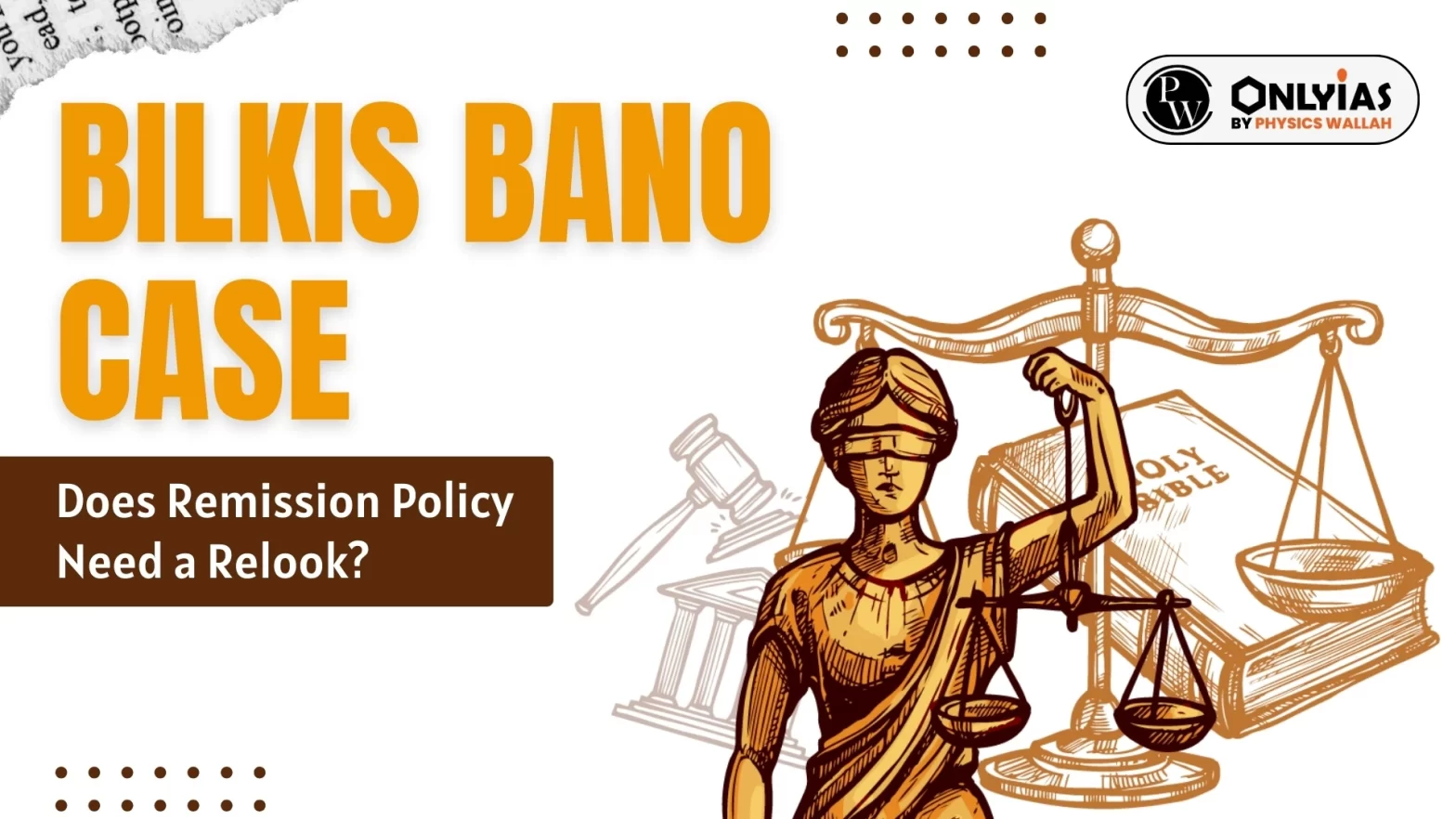Context: This editorial is based on the news “Justice for Bilkis Bano, questions on remission” which was published in the Hindu. The Supreme Court struck down the remission granted by the Gujarat government to 11 convicts who were serving life imprisonment for the gangrape of Bilkis Bano during the communal riots in Gujarat in 2002.
Supreme Court Constitution Bench Decision on Bilkis Bano Case and State’s Role in Remission Policy
- In a Constitution Bench decision in Union of India vs V. Sriharan (2015), the appropriate government to decide a remission application is the State where the convicts are sentenced.
- Consequently, the Court declared the earlier two judge Bench decision of the Supreme Court holding the Gujarat government as the appropriate government to grant remission in this case as illegal.
- In effect, the remission orders for the 11 convicts stand cancelled and the men have been directed to go back to the prison within two weeks’ time.
The Concept of Remission Policy in India
-
The Core Principles of Remission Policy
- If a criminal is curable, he ought to be improved by education and other suitable arts and then set free as a better citizen and less of a burden to the State.
- Prisons are meant to be rehabilitative justice rather than simply being an instrument to carry out retributive punishment
-
Pardoning Power of President and Governor (Constitutional Provisions)
- Both the President (Article 72) and the Governor (Article 161) have the power of pardon.
- However, the President’s power under Article 72 is wider than the Governor under Article 161 which differs in the following two ways:
- Court Martial: President to grant pardon extends in cases where the punishment or sentence is by a Court Martial but Article 161 does not provide any such power to the Governor.
- Death Sentence: The President can grant pardon the sentence of death but the Governor’s power does not extend to death sentence cases.
-
Statutory Provisions for Remission Policy
- The Code of Criminal Procedure (CrPC) provides for remission of prison sentences. The Bharatiya Nagarik Suraksha Sanhita (BNSSS) is a law that replaces the CrPC.
- Prisons is a State Subject. Hence, prison rules of each State identify certain reformative and rehabilitative activities that the prisoners can undertake in order to earn remission in the form of days.
- Section 432: The ‘appropriate government’ may suspend or remit a sentence, in whole or in part, with or without conditions.
- Section 433: Any sentence may be commuted to a lesser one by the appropriate government.
- Power lies to State Governments: So that they may order the release of prisoners before they complete their prison terms.
- Some states have remission policies that completely deny remission opportunities to certain categories of offenders or have significantly longer periods of incarceration for certain offenses before consideration of remission.
- Examples:
- Maharashtra: Remission of Rape case for a victim below 12 years is considered only when a convict has completed 20 years of jail.
- Punjab: Remission of Case for convicts involved in anti-Sikh riots is not considerable.
- Remission of Case for drug convicts is considered only when a convict has completed 25 years of jail.
- However, a blanket denial of remission for crime categories is a punishment framework that is retributive, which the Court needs to take actions as soon as possible.
Must Read: Parliament Passes Three New Criminal Law Reform Bills
-
Guidelines that Need to be followed while Granting Remission
- In ‘Laxman Naskar vs State of West Bengal (2000): The SC laid down five grounds:
- Whether the offense is an individual act of crime without affecting the society at large
- Chance of recurrence of crime
- Whether the convict has lost their potentiality in committing crime
- Whether there is any fruitful purpose of confining the convict any more
- Socio-economic condition of the convict’s family
- Also, convicts serving life sentences are entitled to seek remission after serving a minimum of 14 years in prison.
-
Guidelines by the Supreme Court for Remission Policy
- In Epuru Sudhakar vs State of Andhra Pradesh (2006), SC has held that judicial review of an order of remission is only available when there is a non- application of mind; relevant materials have not been considered, the order is mala fide, or based on irrelevant considerations or suffers from arbitrariness.
-
Associated Challenges with Remission Policy
- Subjectivity: The individualized nature of the inquiry is subjective.
- Arbitrariness: There is both a lack of transparency on how the associated committees are formed to decide individual applications and reasons guiding the decisions.
- Unchecked Discretion: The Bilkis Bano case is an example of unchecked discretion. The concern of non-application of mind is writ large in the case of the 11 convicts in Bano’s case because the orders of the Gujarat government for each of them are exact copies.
Conclusion
In the Bilkis Bano case on remission, the Supreme Court found illegalities and injustices of ‘fraud’ and ‘usurpation of power’ by the government, and, therefore, did not need to go into difficult normative questions.
![]() 10 Jan 2024
10 Jan 2024

